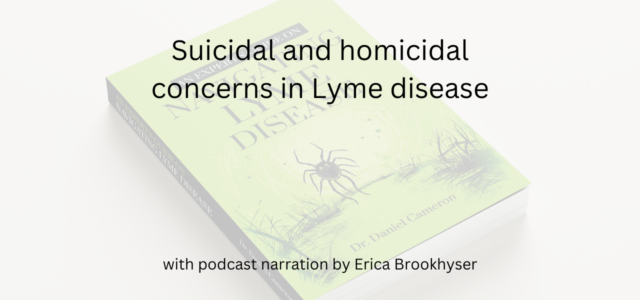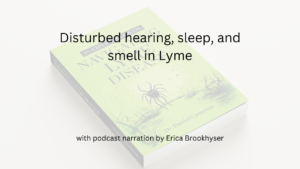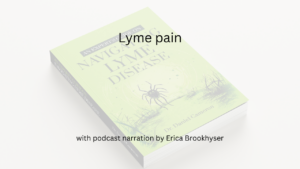Call for your appointment today 914-666-4665 | Mt. Kisco, New York

Welcome to another selection from my book “An Expert’s Guide on Navigating Lyme disease.” The books highlights the findings of my first 600 Lyme disease Science blogs. In this episode, I will discuss suicidal and homicidal concerns in Lyme disease patients.
Dr. Robert Bransfield from Rutgers-Robert Woods Johnson Medical School, Department of Psychiatry, has described suicidal and homicidal concerns in patients with Lyme and related tick-borne illnesses in his private practice. Likewise, in my practice I have seen patients with suicidal thinking.
Suicidal and homicidal behaviors in Lyme disease.
Dr. Robert Bransfield reports observing suicidal and homicidal behaviors in patients with Lyme and related tick-borne illnesses. Out of 253 patients, he found:
43% were suicidal; 32% were suicidal but not homicidal; 11% were both suicidal and homicidal. No patient was homicidal without also being suicidal. 25% had explosive anger but were not homicidal or suicidal. 10% had pre-existing depression. 97% reported depression after infection. Patients were ill an average of 8.4 years before being diagnosed and treated. Read more.
“Further disease progression contributed to him feeling desperate as a result of multiple late-stage symptoms.”
Three psychiatrists share suicidal and homicidal cases.
Three psychiatrists share published case reports supporting Bransfield’s concerns (Munir et al., 2017). “A 44-year-old male without any past psychiatric history presented with a third unsuccessful suicide attempt and was later diagnosed as having a Borrelia infection” (Bransfield, 2017). One month of medical therapy with intravenous ceftriaxone improved his mental status and resolution of suicidal ideation (Banerjee 2013).
Fallon described two cases in a 1995 paper. “I treated both of these patients, and in addition, I have been able to follow the status of Patient B over a span of 30 years. This patient was highly suicidal, had horrific intrusive images of killing others, and had violent impulses, which were eliminated with treatment. Patient A was also suicidal, violent, and physically assaultive to her son. Combined antibiotic and psychotropic treatment helped both patients.” Read more.
[bctt tweet=”Dr. Robert Bransfield reports observing suicidal and homicidal concerns in patients with Lyme and related tick-borne illnesses.” username=”DrDanielCameron”]
Homicide, two assaults, and suicide in Lyme disease patient
An article entitled “A Fatal Case of Late Stage Lyme Borreliosis and Substance Abuse,” describes a patient exhibiting aggressiveness, violence, and homicidality. Like many Lyme disease patients, the man experienced a delay in diagnosis and treatment. (One study reports that subjects enrolling in a trial of Lyme encephalopathy were ill an average of two years before being diagnosed.)
The patient’s Lyme disease symptoms progressed. “Further disease progression contributed to him feeling desperate as a result of multiple late-stage symptoms,” wrote Bransfield et al. According to Fallon et al., the number of Lyme disease patients who feel desperate is not clear.
Based on more than 30 years of experience treating Lyme disease patients, Dr. Bransfield previously described a wide range of neuropsychiatric symptoms in Lyme disease patients. “… neuropsychiatric symptoms, usually presenting with significant comorbidity which may include developmental disorders, autism spectrum disorders, schizoaffective disorders, bipolar disorder, depression, anxiety disorders (panic disorder, social anxiety disorder, generalized anxiety disorder, posttraumatic stress disorder, intrusive symptoms), eating disorders, decreased libido, sleep disorders, addiction, opioid addiction, cognitive impairments, dementia, seizure disorders, suicide, violence, anhedonia, depersonalization, dissociative episodes, derealization and other impairments.”
“A 44-year-old male without any past psychiatric history presented with a third unsuccessful suicide attempt and was later diagnosed as having a Borrelia infection.”
The patient’s condition worsened. “The pathophysiological effects of the infection resulted in an increased number and severity of multisystem symptoms, disability, and substance abuse,” the authors wrote. “He experimented with multiple substances in an effort for relief.”
The authors added, “During acute deterioration of his mental state from phencyclidine withdrawal, NMDA agonism increased, he committed a homicide, two assaults, and suicide.”
In an earlier study, Dr. Bransfield described substance abuse, cannabis use, and intoxication in Lyme disease patients.
Bransfield and colleagues advised prompt diagnosis and treatment of Lyme disease to help prevent addictive disorders, substance abuse, and death.
“More effective diagnosis and treatment and attention to substance abuse potential in these patients may help prevent some cases of addictive disorders, substance abuse, and death.” Read more.
988 Suicide & Crisis Lifeline
The 988 Suicide & Crisis Lifeline is a national network of local crisis centers that provides free and confidential emotional support to people 24 hours a day, 7 days a week in the United States. Anyone with the following concerns can call, text, or chat 988:
- Mental health-related distress.
- Thoughts of suicide.
- Substance use crisis.
- Emotional distress.
- There are specialized services available for veterans, LGBTQ individuals and other groups.
- People who are worried about a loved one who may need support also can call.




Thank you for the statistics Drs. I have been saying these things as many Tick disease experts have for years. But the public likes print, not talk.
I am glad my long term colleague Dr. Robert Bransfield has taken the time to document his lifelong career as a psychiatrist treating Lyme disease.
https://www.ncbi.nlm.nih.gov/pmc/articles/PMC5546819/#top
I can definitely understand this. Diagnosed first with TM. 6 months later, no, it’s MS; try 2 Ocrevus infusions. Deteriorate. Every single day. Telling doctors. Showing doctors. After 2 infusions to “stop progression”, I DETERIORATE to the point I can’t stand, at all. What do they say “you don’t want Ocrevus, fine, we won’t do Ocrevus. If you do not, you will get worse.” Uh . I haven’t. It was due June 1. I’m in complete and utter limbo/lost/broke/insurance running out/forced to stop working… all within 2 years. I walled in with extreme lower back pain only. Now this? And “they” don’t “listen”.
I’m so mad! Insurance, CDC, doctors, hospitals, greed. NOBODY seems to do the RIGHT things. $$$$$$$$$$
So, yeah. I’ve always been a fighter. I’ve had 3 near death experiences already (hence why I beg to see ifd doctor that saved me 20 years ago/bacterial indocartitis).
But this?! And the sheer FIGHT to “advocate for self” all the while losing everything (including brain) and “take care of and focus on self). A joke. I haven’t rested or been near peace since June 2021.
If I had a gun here, I’d probably of grabbed it by now.
I look at massive amount of pills I have to take now, and I wonder, “hmm. How many? What combo? I sure don’t want to mess it up by making myself miserably sick(ER) and not dead.
I wonder every morning why I woke?! Come on God!
I’m a fighter. This passes me off! I have a grandson I have custody of. I’m single. I hang on for him but is that best?
I have no money to pay a lyme specialist. At least not now. I have no money to travel. I have no wheelchair, ramp, car, car accessories.
I wish I could attach a video of my legs, now.
I, like so many I guess, will just die from thus, one way or another.
“You can’t die from MS”. SURE. “She died due to complications of MS”. I do see that clearly now.
I have no desire to kill anyone, yet. I have turned what they’re saying is “mean”. Duh. I’m mad!